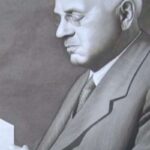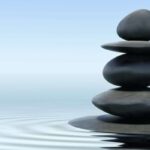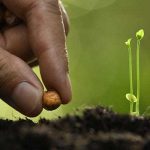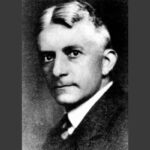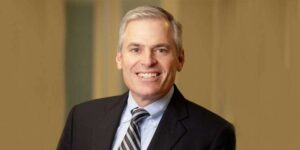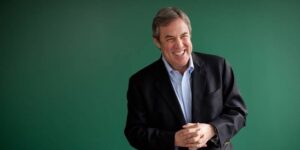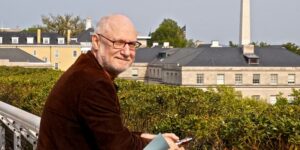Rollo May quotes en biografie
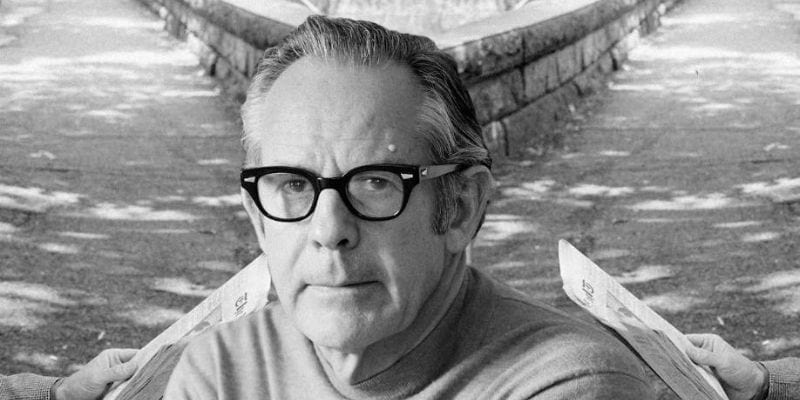
Rollo May (Rollo Reece May, 21 april 1909 – 22 oktober 1994) was een Amerikaanse existentiële psycholoog en auteur, bekend van zijn invloedrijke boek ‘Love en Will’, gepubliceerd in 1969. Rollo May speelde een belangrijke rol in de humanistische psychologie en existentiële filosofie en zijn significante bijdragen aan de existentiële psychotherapie plaatsten hem naast Viktor Frankl.
Biografie van Rollo May
Jeugd
Rollo werd geboren in Ada, Ohio. Zijn jeugd was soms uitdagend vanwege de scheiding van zijn ouders en de diagnose van schizofrenie bij zijn zus. Hij was de oudste van zes kinderen en kreeg veel verantwoordelijkheid, omdat zijn moeder vaak afwezig was.
Zijn vroege ervaringen hebben van May een vooraanstaand psychologisch denker gemaakt. Zelfs na zijn overlijden in 1994 blijven zijn geschriften over persoonlijke groei, creativiteit, existentiële psychologie en psychotherapie relevant, vooral met de verhoogde angst door de wereldwijde pandemie.
Educatie en vroege leven
May’s fascinatie voor psychologie ontstond uit zijn tumultueuze jeugd en de gespannen relatie tussen zijn ouders. Hij volgde zijn universitaire studie aan Michigan State, waar hij Engels studeerde, maar werd weggestuurd vanwege zijn betrokkenheid bij een radicaal studentenblad.
Vervolgens behaalde hij zijn bachelordiploma in Engels aan Oberlin College in Ohio. Na zijn afstuderen gaf May Engelse les in Salonika, Griekenland, waar hij seminars bijwoonde van Alfred Adler, een gerenommeerde psychotherapeut.
Bij terugkomst in de Verenigde Staten behaalde hij in 1938 een bachelordiploma in goddelijkheid (Bachelor of Divinity) en diende korte tijd als predikant voordat hij zich inschreef aan Columbia College voor een PhD in klinische psychologie.
Vanaf 1943 werkte May als begeleider, docent en medewerker aan het William Alanson White Institute in New York City. In 1946 richtte hij zijn eigen praktijk op. Zijn loopbaan in het onderwijs besloeg de periode van 1955 tot 1975 aan de New School for Social Research voordat hij in 1975 naar Californië verhuisde.
Zijn impactvolle literaire bijdragen omvatten opmerkelijke boeken zoals ‘Man’s Search for Himself’, ‘Love and Will’, ‘The Meaning of Anxiety’, en ‘The Courage to Create’. Daarnaast was hij mede-oprichter van de Saybrook Graduate School and Research Center in San Francisco.
Ondanks tegenslagen, waaronder een diagnose van tuberculose in 1942 die leidde tot 18 maanden in een sanatorium, heeft zijn reis langs verschillende scholen en ervaringen zijn toekomstige bijdragen aan het veld van de psychologie aanzienlijk beïnvloed.
Bijdragen aan de psychologie
Rollo May leverde significante en blijvende bijdragen aan het vakgebied van de psychologie. Hij liet een diepgaande invloed achter op het begrip van menselijk gedrag en bewustzijn.
Als pionier van de existentiële psychologie benadrukte May het belang van individualiteit, persoonlijke verantwoordelijkheid en de zoektocht naar betekenis in het leven.
Met zijn invloedrijke geschriften, waaronder ‘Liefde en Wil’, ‘De Betekenis van Angst’, en ‘De Moed om te Creëren’ onderzocht May complexe menselijke emoties en de existentiële dilemma’s waarmee individuen geconfronteerd worden. Hij dook diep in angst, liefde en creativiteit, en bood waardevolle inzichten in de menselijke psyche en de menselijke conditie.
May’s werk als behandelaar en docent speelde ook een cruciale rol in de vormgeving van het vakgebied. Hij pleitte voor existentiële psychotherapie, waarbij de nadruk lag op het helpen van individuen om existentiële uitdagingen en conflicten in het leven aan te gaan.
Zijn therapeutische benadering moedigde cliënten aan om op een authentieke manier met hun problemen om te gaan, waardoor persoonlijke groei en zelfbewustzijn gestimuleerd werden.
Quotes van Rollo May
- “A myth is a way of making sense in a senseless world. Myths are narrative patterns that give significance to our existence.”
- “Artistic symbols and myths speak out of the primordial, preconscious realm of the mind which is powerful and chaotic. Both symbol and myth are ways of bringing order and form into this chaos.”
- “Communication leads to community, that is, to understanding, intimacy and mutual valuing.”
- “Courage is necessary to make being and becoming possible.”
- “Courage is not the absence of despair; it is, rather, the capacity to move ahead in spite of despair.”
- “Courage is the basic virtue for everyone so long as he continues to grow, to move ahead.”
- “Creative people, as I see them, are distinguished by the fact that they can live with anxiety, even though a high price may be paid in terms of insecurity, sensitivity, and defenselessness for the gift of the ‘divine madness’.”
- “Depression is the inability to construct a future.”
- “Dogmatism of all kinds… are threatened by the creative freedom of the artist.”
- “Every human being must have a point at which he stands against the culture, where he says, this is me and the damned world can go to hell.”
- “Finding the center of strength within ourselves is in the long run the best contribution we can make to our fellow men. One person with indigenous inner strength exercises a great calming effect on panic among people around him. This is what our society needs — not new ideas and inventions; important as these are, and not geniuses and supermen, but persons who can ‘be’, that is, persons who have a center of strength within themselves.”
- “Fortunately, however, we no longer have to argue that self-love is not only necessary and good but that it also is a prerequisite for loving others.”
- “Freedom is man’s capacity to take a hand in his own development. It is our capacity to mold ourselves.”
- “Good art wounds as well as delights. It must, because our defenses against the truth are wound so tightly around us.”
- “Hate is not the opposite of love; apathy is.”
- “Human freedom involves our capacity to pause between the stimulus and response and, in that pause, to choose the one response toward which we wish to throw our weight. The capacity to create ourselves, based upon this freedom, is inseparable from consciousness or self-awareness.”
- “If you do not express your own original ideas, if you do not listen to your own being, you will have betrayed yourself.”
- “In order to be open to creativity, one must have the capacity for constructive use of solitude. One must overcome the fear of being alone.”
- “Intimacy requires courage because risk is inescapable. We cannot know at the outset how the relationship will affect us. Like a chemical mixture, if one of us is changed, both of us will be. Will we grow in self-actualization, or will it destroy us? The one thing we can be certain of is that if we let ourselves fully into the relationship for good or evil, we will not come out unaffected.”
- “It is an ironic habit of human beings to run faster when they have lost their way.”
- “It is dangerous to know, but it is more dangerous not to know.”
- “It is interesting to note how many of the great scientific discoveries begin as myths.”
- “Love is generally confused with dependence; but in point of fact, you can love only in proportion to your capacity for independence.”
- “Many people feel they are powerless to do anything effective with their lives. It takes courage to break out of the settled mold, but most find conformity more comfortable. This is why the opposite of courage in our society is not cowardice, it’s conformity.”
- “Many people suffer from the fear of finding oneself alone, and so they don’t find themselves at all.”
- “One does not become fully human painlessly.”
- “One must have at least a readiness to love the other person, broadly speaking, if one is to be able to understand him.”
- “One of the few blessings of living in an age of anxiety is that we are forced to become aware of ourselves.”
- “People only change when it becomes too dangerous to stay the way they are.”
- “Real freedom is the ability to pause between stimulus and response, and in that pause, choose.”
- “Recall how often in human history the saint and the rebel have been the same person.”
- “Technology is the knack of so arranging the world that we do not experience it.”
- “The human being cannot live in a condition of emptiness for very long: if he is not growing toward something, he does not merely stagnate; the pent-up potentialities turn into morbidity and despair, and eventually into destructive activities.”
- “The opposite of courage in our society is not cowardice, it is conformity.”
- “The poet, like the lover, is a menace on the assembly line.”
- “The relationship between commitment and doubt is by no means an antagonistic one. Commitment is healthiest when it is not without doubt, but in spite of doubt.”
- “The turtle only makes progress when it’s neck is stuck out.”
- “The ultimate error is the refusal to look evil in the face.”
- “Therapy isn’t curing somebody of something; it is a means of helping a person explore himself, his life, his consciousness.”
- “To love means to open ourselves to the negative as well as the positive – to grief, sorrow, and disappointment as well as to joy, fulfillment, and an intensity of consciousness we did not know was possible before.”
- “What if imagination and art are not frosting at all, but the fountainhead of human experience?”
- “When we are dealing with human beings, no truth has reality by itself; it is always dependent upon the reality of the immediate relationship.”
Boeken, artikelen en andere publicaties
- 1950. The meaning of anxiety. Ronald Press Company.
- 1958. The origins and significance of the existential movement in psychology.In R. May, E. Angel, & H. F. Ellenberger (Eds.), Existence: A new dimension in psychiatry and psychology (pp. 3–36). Basic Books/Hachette Book Group
- 1959. The nature of creativity. ETC: A review of general semantics, 261-276.
- 1960. Existential bases of psychotherapy. American Journal of Orthopsychiatry, 30(4), 685.
- 1960. The significance of symbols. ETC: A Review of General Semantics, 301-338.
- 1965. Intentionality, the heart of human will. Journal of humanistic psychology, 5(2), 202-209.
- 1969. Love and will. WW Norton & Company.
- 1975. Values, Myths, and Symbols. The American Journal of Psychiatry, 132(7), 703-706.
- 1979. Psychology and the human dilemma. WW Norton & Company.
- 1982. The problem of evil: An open letter to Carl Rogers. Journal of Humanistic Psychology, 22(3), 10-21.
- 1985. The Wounded Healer. Saybrook Review.
- 1986. Transpersonal or transcendental?. The Humanistic Psychologist, 14(2), 87-90.
- 1989. Existential psychotherapy. Current psychotherapies, 363-402.
- 1990. Will, decision and responsibility.In K. Hoeller (Ed.), Readings in existential psychology & psychiatry (pp. 269–278). Review of Existential Psychology & Psychiatry
- 1991. The cry for myth. W. W. Norton & Company.
- 1994. The courage to create. WW Norton & Company.
- 1998. Power and innocence: A search for the sources of violence. WW Norton & Company.
- 1999. Freedom and destiny. WW Norton & Company.
- 2005. The art of counseling. Dar El Kalema Publishing House.
- 2015. The discovery of being. WW Norton & Company.
- 1958. Contributions of existential psychotherapy. In R. May, E. Angel, & H. F. Ellenberger (Eds.), Existence: A new dimension in psychiatry and psychology (pp. 37–91). Basic Books/Hachette Book Group.
- 1994. Existence. Jason Aronson.
- 2009. Man’s search for himself. WW Norton & Company.
- 1961. Existential psychology. New York: Random House.
- 1995. The psychology of existence: An integrative, clinical perspective. New York: McGraw-Hill.
Citatie voor dit artikel:
Janse, B. (2023). Rollo May. Retrieved [insert date] from Toolshero: https://www.toolshero.nl/bekende-auteurs/rollo-may/
Oorspronkelijke publicatiedatum: 15/08/2023 | Laatste update: 07/12/2023
Wilt u linken naar dit artikel, dat kan!
<a href=”https://www.toolshero.nl/bekende-auteurs/rollo-may/”>Toolshero: Rollo May</a>


